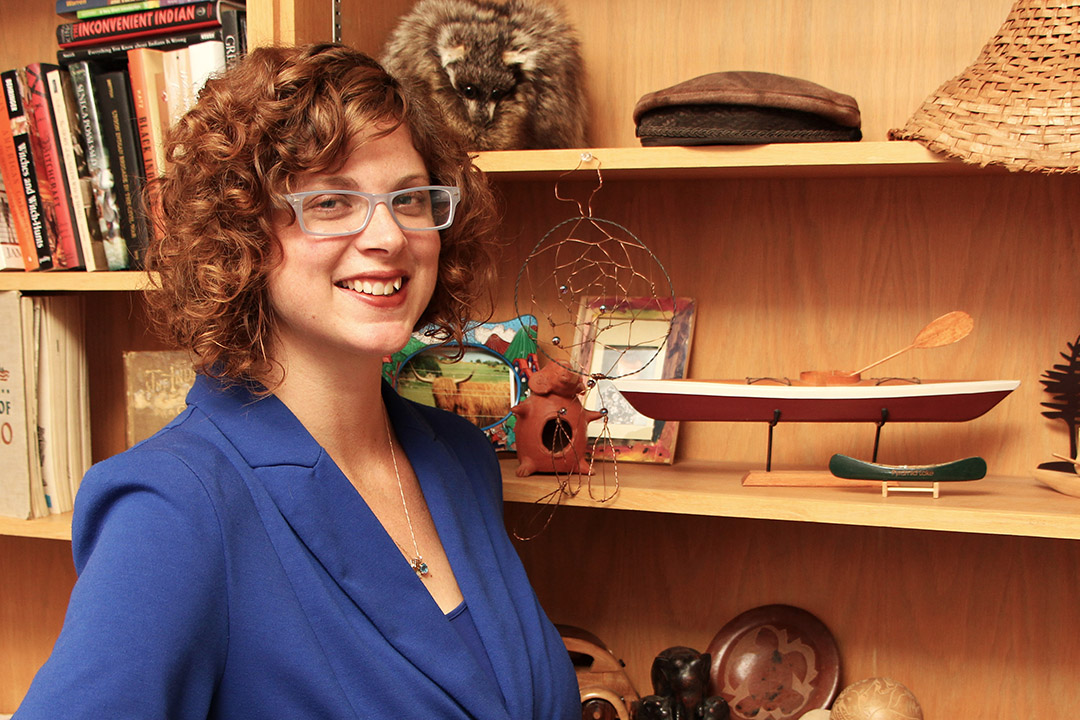
Historian honoured with New Researcher Award
One of the most significant moments of Professor Kathryn Labelle’s life came in 2017, when she was given an honour name in recognition of the work she has done with the Wendat people.
By Shannon BoklaschukThe honour name—Yari:mema?/She Carries the Story Along—was approved by a body of faith keepers of the North American Wendat Confederacy before it was bestowed on Labelle during a private ceremony in Michigan.
“That was pretty incredible,” she said.
Another professional highlight for Labelle came even more recently—on Oct. 27, 2018—when she received the New Researcher Award at the University of Saskatchewan’s Fall Convocation ceremonies.
“It doesn’t seem real,” Labelle said of being chosen for the award.
“I actually Googled it a bunch of times on the university website when I first heard, because I was like, ‘This can’t be right,’ ” she said with a laugh. “All of the other people who have received this award before are like awesome rock stars, so it is exciting but also sort of overwhelming—because you feel like there’s a lot of responsibility with that.”
Since joining the Department of History in the College of Arts and Science in 2012, Labelle has earned an international reputation for her work in Indigenous history, with a focus on the Wendat (Wyandot) communities in Quebec, Ontario, Michigan, Kansas and Oklahoma. The Wendat people, also referred to as the Huron by the French, are known in high school history books as having had contact with Samuel de Champlain when the French explorer came to Turtle Island (Canada).
Labelle’s acclaimed book Dispersed But Not Destroyed: A History of the Seventeenth-Century Wendat People received the 2014 John C. Ewers Award from the Western History Association. It was also shortlisted for the Canadian Historical Association’s Sir John A. Macdonald Prize (rebranded as the CHA Prize for Best Scholarly Book in Canadian History). In the book, Labelle demonstrated that the Wendat people did not disappear, as many historians had claimed, but were instead dispersed in the wake of attacks from the Iroquois.
As an undergraduate history student at the University of Ottawa, Labelle took classes from Professor Georges Sioui, a Wendat community member who introduced her to people from the Wendat nations. Sioui also encouraged Labelle to pursue her master’s degree, which she received in Ottawa before earning a PhD in history at Ohio State University.
Labelle continues to work alongside and build relationships with the Wendat people. Her next book will focus on seven Wendat women spanning a large timeframe from the 1650s to 2006, and she has sought input from a group of Wendat women chosen by their communities to serve as her advisory council.
“They want their stories to be told; they want them to be published,” said Labelle. “They want people to know that they exist, so that was sort of the impetus for the first book.”
The New Researcher Award recognizes the outstanding research achievements of a faculty member who is within 10 years of completing their PhD. Considered one of the leading ethnohistorians in Canada, Labelle already has an impressive publication history. It includes an award-winning single-authored monograph, a co-edited book, a dozen book chapters or peer-reviewed articles, and co-editing a special issue of a journal—all within seven years of earning her doctorate.

